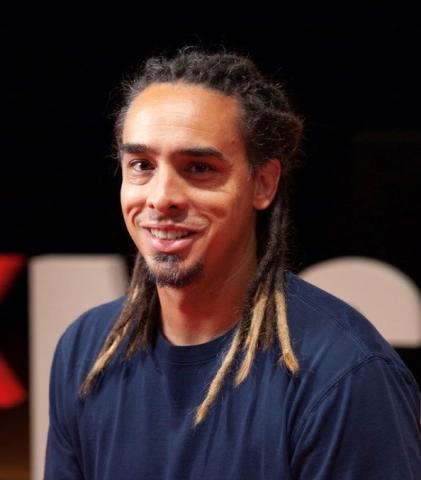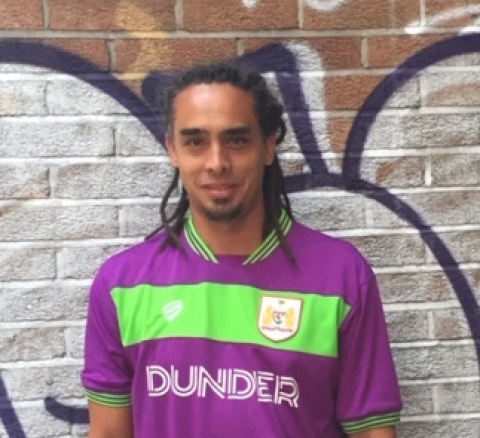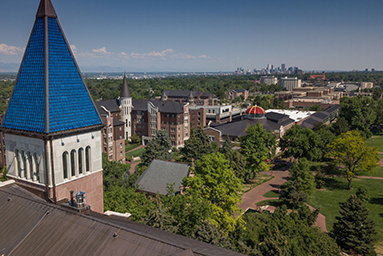Q&A: Celebrating Black History Month with Travis Heath
When Travis Heath was in high school, “psychology” was just a big word that started with the letter “p.” Not until he returned to high school as a basketball coach did he begin to understand what the word really meant.
Leading the team at Conifer High School, psychology signified something as enjoyable and meaningful as Heath’s work on the court. He treasured the chance to help his players and their families find a way through their struggles.
As he progressed in his career—as a graduate student in California, a professor at Metropolitan State University of Denver, and now an associate professor in DU’s Graduate School of Professional Psychology—Heath began to push the boundaries of what was traditionally considered psychology and what wasn’t. He began incorporating the ideas of Black abolitionist thinkers. He explored how rap music facilitated healing.
“Therapy has to adapt, or it will die,” Heath says. “If we try to do therapy the same way now that we did in a pre-COVID world, with no sort of regard for COVID and how it's changed the landscape of our lives, that's not going to work out so well. And moreover, it's going to be dangerous. The world changes, right? People change, our therapies have to adapt.”
Most notably, Heath is focused on taking psychology from the individual to the community level. Since arriving at DU in 2020, he’s exemplified that attitude as co-director of GSPP’s program on International Disaster Psychology: Trauma and Global Mental Health, and as the school’s director of diversity, equity and inclusion.
In an interview with the DU Newsroom, before he appears on a panel for DU’s Black History Month celebration, Heath explains some of his research and details the inequities he sees in higher education.
This interview has been edited for clarity and brevity.
You gave a TED Talk in 2019 in which you advocated for a systemic model of care and a less individualistic model. What does that look like, and why is it important?
It can look a lot of different ways, but one of the first things that comes to mind is that when someone is suffering, [often] the prescription they get—medication or a behavioral prescription—is inherently individualist. “Change the way you think,” right? “Change your diet, change the way you exercise,” whatever it is.
In a systemic model of care, the first place we would look is the community. In what ways are people connected or disconnected from community? In what ways do people need to be reconnected to community? In what ways are the communities we're a part of meeting our needs or not meeting our needs? How are we engaging in mutual aid within our communities?
Psychology, especially clinical and counseling psychology, is so focused on the individual person that the person often becomes divorced from the society they're part of. When we do that, we miss these really important and strong cultural influences. And while I can't change the culture as an individual psychologist, I can certainly invite people to start looking at the relationships they have with elements of the culture and maybe change some of those relationships or form more preferred relationships within the culture.
Can you explain what international disaster psychology is and what the program addresses?
I think, to be honest, our program really embodies what's after the colon [in the program’s name] more these days: trauma and global mental health. Not to say that our students aren't trained in the ability to provide things like psychological first aid after a crisis, but what sets our program apart is the focus on trauma and thinking about trauma as it connects to community.
Communities have been responding to trauma for as long as there have been human beings. And often the way that communities responded was in community ways. But now it's been privatized, right? Someone experiences trauma and, if they're lucky enough to have insurance or money, then they can go seek individual therapy. And there can be benefits to individual therapy. I'm not discounting that.
But what I'm saying is that those ways of working through trauma, the ways that psychology and psychiatry have done it more recently, in some ways are disconnected from more community ways …. So our program is uniquely positioned. Our students do individual therapy work, which is great, and they learn about being community workers and facilitating community processes … in a way that is culturally relevant and culturally near to whoever the person or people are that we're serving.
What are you working on right now as GSPP’s director of DEI?
I got here fall of 2020 and, for that first quarter, I interviewed anyone who would speak to me—current students, alumni, staff, faculty, anyone. Over a hundred people. Really, there were only two questions I was asking. “What are we doing well in DEI and where can we get better?” And, "If you had a magic DEI wand, what would you do? What would you prioritize? What initiatives would you put in place?" After three months or so, [I] went through [the interviews] and found, I think, 11 themes that were coming up over and over again about where we could be better.
We've sort of prioritized the top five and formed sub-committees. One is DEI in the classroom and curriculum. Some of what we've been doing there is diversifying the [academic] sources that we draw from. We've come up with this document—I think it's over 10 pages now—that has diverse authorship by topic. We hear from faculty a lot, "Oh, I'm really busy. I'd like to do that, but I can't." Now we have a living document where they can go for the topics, whatever the topics are for their particular course, they can draw upon those, and they can take some of these readings. That helps to diversify the course.
At the heart of this for me is the belief that racism does exist. Racism does exist systemically. And if it exists systemically, we're not going to change it by [changing] individual hearts and minds. For me, when we address it systemically, we're looking at three things. We're looking at land, labor and resources.
Now the first one, land, that's a particularly difficult topic here at DU. I won't go down that particular path right now, but the labor and resources part, I mean, those are things that we can look at and quantify. In terms of labor, what are people's job responsibilities? What's the hidden labor that's happening that people aren't being given credit for—that Black and brown folks, especially Black women, are doing disproportionately [in higher education]. And then resources: What are people getting paid? Those are things that can be quantified. We can do something with that. Trying to change hearts and minds, to me, is a largely ineffective strategy. It's proven to be ineffective because it treats racism as an individualist property as opposed to something that's systemic.
I listened to an interview you did for the Clarion’s podcast, and my ears perked up when I heard you say, essentially, that DEI is a fine initiative, but it's not an end to transforming the institution. So my question is: How do we begin transforming DU?
DU is its own ecosystem, but it exists as a larger sort of exemplar of the academy. One example that I've heard going around on a lot of campuses is the idea of cluster hires— basically hiring a cluster of Black and brown folks across departments. And that begins to take care of the “D” in DEI, “Diversify.” That's the easiest part. But to me, if you're going to do a cluster hire, you then have to ask, "What are we doing to ensure cluster retention?" And when I'm saying that DEI isn't enough, DEI to me doesn't account for that. A cluster retention would require transformation because we know, historically, Black and brown folks are denied tenure at a much higher rate than white folks. A lot of times, we weren't even on tenure lines to begin with because tenure lines are limited. What is it about the system that is denying tenure disproportionately to Black and brown folks? And that's the part that's really hard. That's the transformational part of what we need to do with the academy.
We have to acknowledge that the academy is a colonial structure. And once we've acknowledged that, can we work toward transforming it? Yes. Now I don't know that it'll ever be fully decolonized, but if we're going to start from a false premise or a premise that is never really acknowledged, then I don't think we can get anywhere. But if we acknowledge that it's a colonial structure, OK, well, we've acknowledged that and how that's disproportionately harmed folks. And then what are the ways that we are going to try to find pockets of decolonization that might move toward transforming the institution?
This is also why, of course, it's important to have diversity of leadership, right? Because as leadership diversifies, some of us are going to see things right away that other folks are going to miss. And some of that might have to do with our race, whatever our identity statuses are. Our lived experience is sometimes going to help us see something that other folks would miss.
You’ll be a panelist at DU’s Black History Month event, which is looking at DU's history with the Black community and the Black Lives Matter movement. What can people expect?
What I hope is that it is an opportunity for the Black experience to be centered and for the conversation to be honest and sometimes challenging. But also, community building. We can feel all those things to hold all those things at once. Especially for white folks who might be watching such a panel, it might require holding discomfiture while also feeling the ways in which these kinds of conversations can build community.
So, to be honest, I hope people don't leave the panel and just feel happy. That wouldn't have been a very good panel. I hope they leave feeling challenged. I hope they leave maybe with some uneasiness. I hope they leave also with some ideas and maybe some momentum, some energy about transformation.





